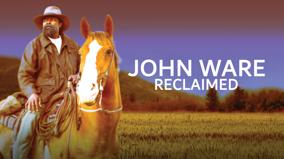Sòl
Many Black, racialized and immigrant women work with elderly patients as healthcare providers. Their jobs, already arduous and underpaid as it is, have become even more exhausting during the COVID-19 pandemic. While some public commentators have described them as overrepresented in this sector because of their culture, and hailed them as “guardian angels,” what do they themselves have to say? This cross-sectional portrait of some of these women takes the form of a meditative essay.

-
 The Curve2020 7 editions
The Curve2020 7 editionsThe Curve is the pulse of our nation, beating in its own time during this unprecedented time. Our creators, with their talent and insight, are bringing to life the voices of Canadians touched by COVID-19, both near and far. The Curve is an online destination where these experiences will be expressed in animation, documentary and digital storytelling formats.
Details
Many Black, racialized and immigrant women work with elderly patients as healthcare providers. Their jobs, already arduous and underpaid as it is, have become even more exhausting during the COVID-19 pandemic. While some public commentators have described them as overrepresented in this sector because of their culture, and hailed them as “guardian angels,” what do they themselves have to say? This cross-sectional portrait of some of these women takes the form of a meditative essay.
-
directionValérie BahTatiana Zinga Botao
-
writingValérie BahTatiana Zinga Botao
-
participationRoselène ClémentMary Bercy
-
producerPierre-Mathieu Fortin
-
cinematographerValérie Bah
-
editingMyriam Magassouba
-
sound designIlyaa Ghafouri
-
location soundArya Afshar Mohajer
-
production managerYousra Benziane
-
driverMasha Nazina
-
technical support - editingPierre DupontMarie-Josée GourdePatrick Trahan
-
titles designDaphnée Brisson-Cardin
-
infographicsAlain OstiguyCynthia Ouellet
-
online editingYannick Carrier
-
foleyNicolas Gagnon
-
foley recordingGeoffrey Mitchell
-
re-recordingIsabelle Lussier
-
musicElena Stoodley
-
administratorSia Koukoulas
-
senior production coordinatorJoëlle Lapointe
-
production coordinatorAlexandra BourqueChinda Phommarinh
-
studio coordinatorGabrielle Dupont
-
technical coordinatorDaniel Claveau
-
line producerMélanie Lasnier
-
executive producerNathalie Cloutier
Education
Ages 13 to 18
Diversity - Black Studies
Ethics and Religious Culture - Ethical Values
Family Studies/Home Economics - Aging/Death and Dying
Social Studies - Contemporary Issues
Short documentary that’s part of The Curve, a series about life during the pandemic. A moving, meditative essay that features the voices of Black women who work tirelessly to care for elderly patients as healthcare providers, and yet still face racism. A very personal and compelling account of how hurtful racism is. If class is properly prepared for a respectful discussion, could be used as a conversation starter about racism. How do you feel about the nurse not giving the nun she cared for forgiveness?
















